In today’s digital climate, ecommerce SEO is unquestionably critical for the survival and success of today’s online retailers. Ecommerce businesses today cannot succeed without it, and keyword research is a pivotal component of ecommerce SEO.
Why is SEO Important for Ecommerce?
Online retail is big business. In just 20 seconds, Americans will spend $182,648 shopping online. Australians’ online retail spending was up to $17.4 billion in 2015, resulting in 5.7% YoY growth.
It’s a booming business that many want to take advantage of. But big business means big competition. So how do we make your ecommerce stand apart from the rest?
The majority of consumers use search prior to making a purchase online, and these stats prove it:
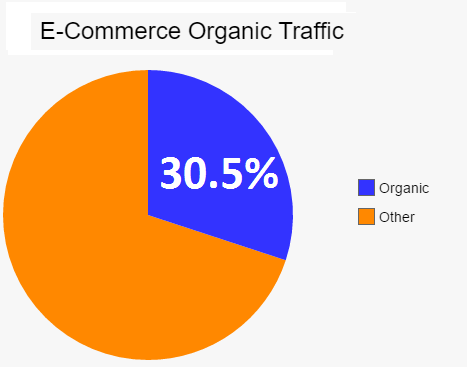
- Kissmetrics discovered 30.5% of ecommerce traffic originates from organic search.
- According to NChannel reports, 44% of online shoppers begin their online retail experience using a search engine.
- A study by Custora discovered 26% of ecommerce online orders come from organic search engine traffic.
And getting on the first page of search engines is equally critical.
Leading SEO giant MOZ found that 71% of search engine clicks are on page one of the search results.
These stats demonstrate that organic search is very much a big part of giving ecommerce exposure. The bigger the exposure, the higher the chances of conversion.
Therefore, SEO is an element that should not be overlooked by ecommerce businesses. On the contrary, it should be a key part of it.
Why Does Ecommerce Keyword Research Matter?
In today’s digital climate, ecommerce SEO is unquestionably critical for the survival and success of today’s online retailers.
Ecommerce businesses today cannot succeed without it, and keyword research is a pivotal component of ecommerce SEO.
In addition to that, ecommerce websites have to take into account new ranking factors like site speed, user experience, organic click through rate and responsive design.
Keyword research is the process of understanding the terminology your potential customers use in search engines to find the products you’re selling. The keywords are then matched to fit your ecommerce website and brand.
Based on your research, you can build a keyword map that you can use to build and optimise your site, create content for product descriptions and write blog posts.
Keyword research influences other SEO-related tasks you perform on your site. This includes on-page optimisation and technical SEO, as your URLs and site architecture need to factor in keywords.
Ultimately, it’s about helping search engines better understand what your website is all about. This is so that they can better match your ecommerce site to relevant search terms.
This is why it’s crucial to select your keywords with care. The better the match, the more likely you’ll score a high position on a search engine results page. This will increase exposure, traffic and sales.
While getting on the first page of a search engine is important, scoring a high position on the first page first is just as crucial. The difference in search result positions is vast, as demonstrated by the graph below:
CTR in SERP Positions
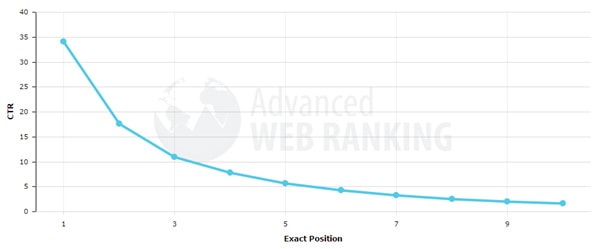
Graph: Google Organic CTR History for International searches in May 2016
Image Source: Advanced Web Ranking
From the graph, we learn that getting on the first page will not necessarily score you a big chunk of the traffic flow. The difference between the last position on the first page (10) is 21x less than the first position.
This demonstrates how crucial it is to rank closer to the top of the first page. The closer you are to the top of the first page, the more traffic and potential sales you’ll get. The change in just a few positions can spell the difference between profit and loss.
What Kind of Keywords Do I Need to Focus On?
As an ecommerce website, the keywords should predominantly revolve around product pages. Hence, you’d need to approach keywords research with product-related keywords in mind.
How do you do this?
1. Search Autocomplete on Major Ecommerce Sites
Some of the biggest ecommerce sites in the world are a great starting point for your keyword research. Have a look at sites like eBay, Etsy and Amazon. See what they’re doing and take a couple of pointers from these leaders of the industry.
They are a great source for mining product-driven keywords that have been proven to work for some of the world’s biggest online retailers.
Just use their search tool to view keyword Autocomplete suggestions by entering a keyword that describes one of your products.
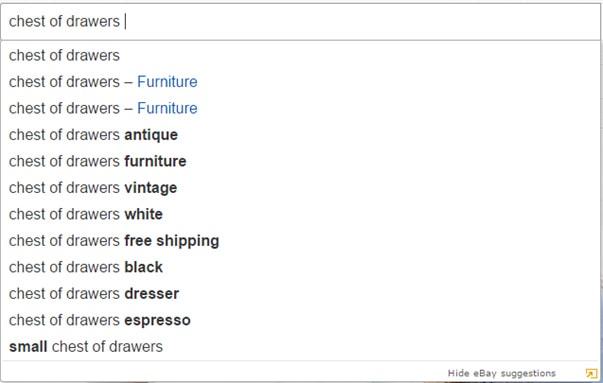
The search results are most likely very targeted, long-tail keywords. These keywords are less competitive and convert better than medium-tail keywords.
In addition to keywords, the search results often suggest categories at the top of the list. You can use these for your category pages.
2. Google’s Suggestions
One of the more obvious tools out there for keyword suggestions is Google’ suggestions. Just do a Google search and you’ll get a bunch of related suggestions at the bottom of the page.
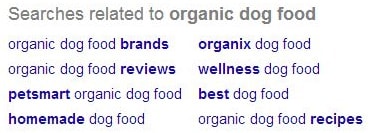
3. Compare Against Competitors
Category pages are often overlooked when it comes to keywords and optimisation. Truth of the matter is, category pages still bring in traffic and generate sales.
So, leverage on what your competitors have listed on their sites. Look for the relevant category and find category-focused keywords that would fit with your business.
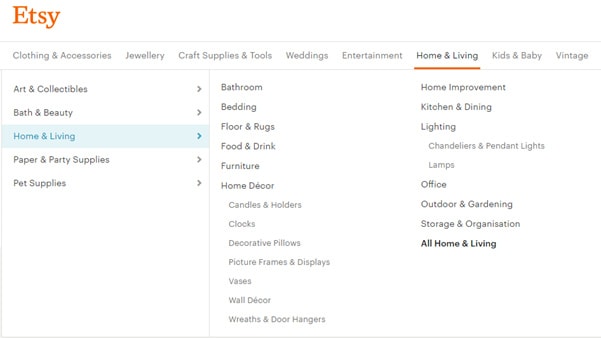
Contact Us for Advanced Keyword Research
GET FREE QUOTE
4. KeywordTool.io
Keyword Tool gives the option of exploring several search engines or major sites of your choice for keyword suggestions. You have the option of exploring keyword suggestions in Google, YouTube, Bing, Amazon, and even App Store.

While it has a paid pro option called ‘Keyword Tool Pro’, its free option still provides plenty of suggestions. The search for ‘headsets’ came up with 545 unique keywords. The pro tool allows access to its other data, such as search volume, CPC and AdWords competition.
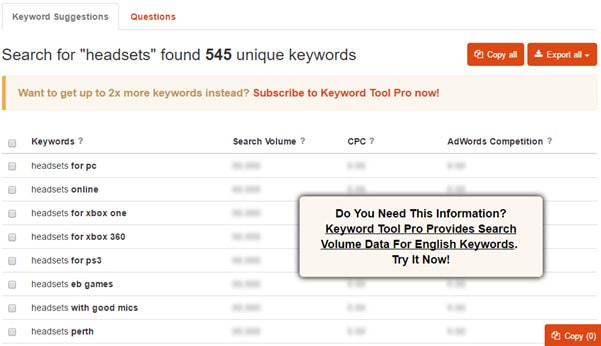
5. Free Keyword Suggestion Tool
If you’re looking for a free keyword generator tool, SEO Review Tools offers Keyword Suggestion Tool.
All you need to do is key in your product keyword, select the country of choice, and enter the Captcha code (usually just simple equations like 5+7).
The tool generates the keyword trend, primary keyword suggestions, and keyword synonyms.
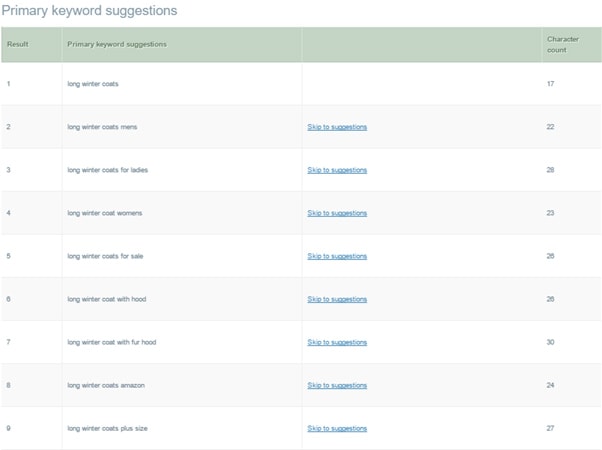
On top of that, it also provides an extensive list of secondary keyword suggestions.
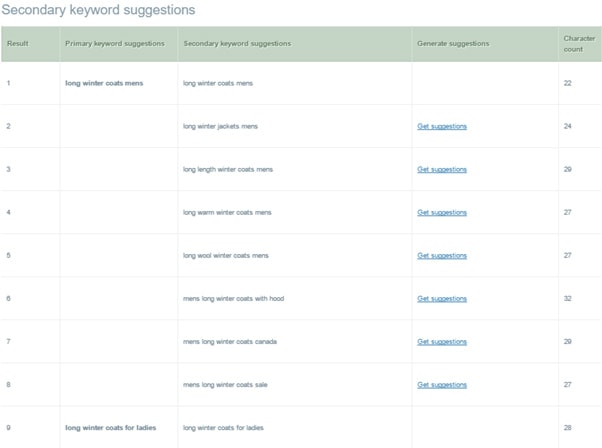
6. Keyword Tool Dominator
Search Autocomplete suggestions tend to display only a couple of keywords due to limited space. Keyword Tool Dominator offers the rest of the keywords on Amazon and often generates dozens of keyword suggestions.
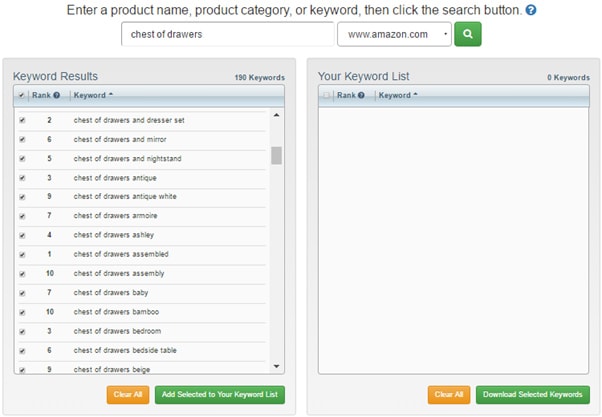
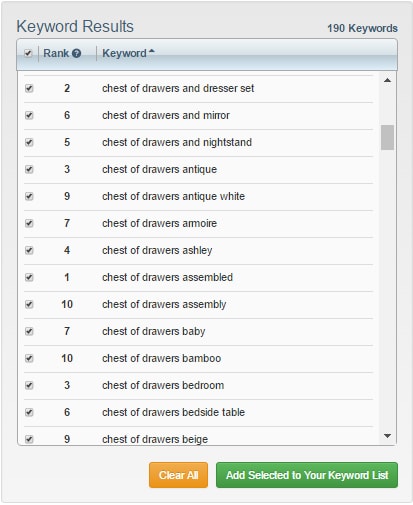
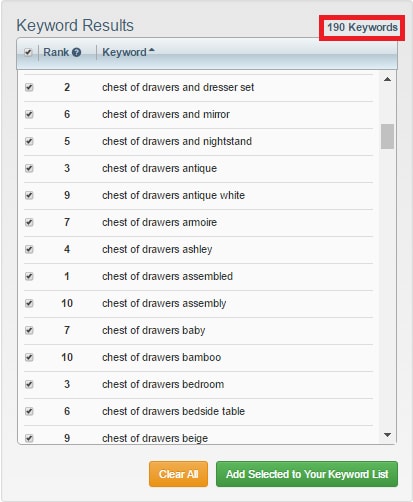
In addition to the wealth of keywords, it’s also organised because it allows you to choose and save your selected keywords to a list.
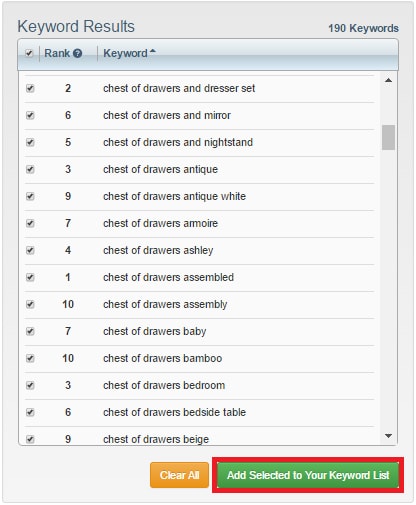
Which Keywords Should I Use for Which?
Ideally, you’d want to use a keyword that a lot of people search for. The higher the search volume, the bigger the chances of getting found by a potential customer.
Keyword search volume shows the number of times people search for a keyword in the search engine in a given location and time period. In most cases, it’s shown as average monthly searches for the term over a 12-month period.
Search volume is absolutely crucial to assessing a keyword, as it shows how in demand it is. However, it’s hard to tell what constitutes a high search volume for a keyword. It really depends on the industry. You’ll get to gauge what’s high and what’s not after spending enough time looking at the numbers.
Use the Google Keyword Planner to check search volume and commercial intent of a keyword. Search volume can be found under ‘Avg. monthly searches’.
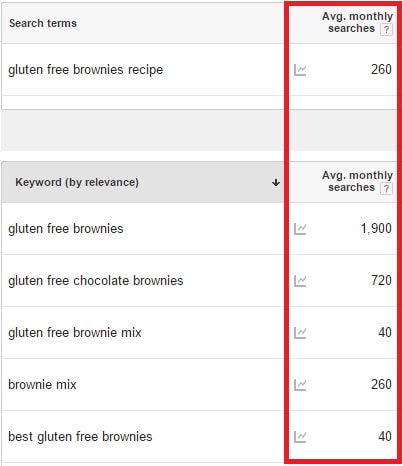
As search terms can fluctuate throughout the year, it may be wise to choose terms that perform more consistently. Alternatively, if you are only targeting the keyword for a certain period, choose the ones that perform well within that period. Hover over the little icon next to each keyword to view its search volume performance in a year.
How Well Does the Keyword Fit My Product?
Just because a keyword has a high search volume, does not mean it’s the right keyword for your product. It may not fit your brand, your website, or your business.
It’s not recommended to choose a keyword that is mildly related to your product over one that is a fitting description just because it has a higher search volume.
Choose keywords that provide a fitting description of the product you’re trying to sell and appropriately reflects your business.
Does The Keyword Have Commercial Intent?
Does the keyword reflect the searcher’s willingness to purchase? Does it imply that they are going to take action, rather than just browse?
If it does, then it probably has a worthy commercial intent. People most likely have intentions to buy if they search keywords like ‘headset online shopping’, rather than ‘headset’. The latter keyword may be used for informational searches. They may just want to browse, compare or research information on headsets, rather than buying one.
According to Moz, longtail keywords comprise over 70% of online searches and have the tendency for a higher conversion. This is because longtail keywords’ descriptive nature tend to imply the intention to purchase.
Longtail keywords are generally less competitive and more targeted. If you have a niche category such as ‘gluten free brownies recipe’ or ‘vegan brownies recipe’, use them instead of just ‘brownies recipe’. You’ll have a higher chance of getting found by the right people.
The ‘Suggested bid’ column in Google Keyword Planner shows the amount that advertisers are paying for a keyword based on costs-per-click (CPCs). The higher the amount, the more in demand it is.
It also suggests which keywords are seen as more valuable to the advertisers’ eyes. The suggested bid for ‘headset online shopping’ scores a high $8.24. This is likely because it’s seen as a keyword used by people further along the buying cycle who are ready to make a purchase.

On the other hand, ‘headset’ scores a lower bid of $1.64. This suggests that advertisers may not see this as a high value, converting keyword. This is because the searcher is more likely in the early information-gathering stage in the buying cycle.

However, it’s worth noting some keywords with high suggested bids sometimes get fewer searches. Hence, it’s important to weigh in all factors before deciding on the right keyword.
Note:
If you are looking to do content marketing for eCommerce sites, informational keywords are useful for creating content. Content with informational keywords result in higher traffic and are easier to rank for, build links to, and increase customer trust.
Contact Us for Advanced Keyword Research
GET FREE QUOTE







